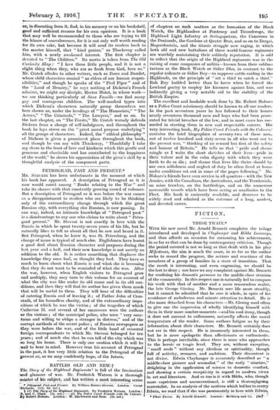BATTLES OLD AND NEW.?
.The Story of the Highland Regiments' is full of the fitscina.tion and glamour of war. Mr. Frederick Watson is a thorough ;master of his subject; and has written a most interesting series -I.- Petrograd, Past and Present. By William Barnes Steven!. London • Grant- :Ill.:bards. [12s. 8d. net.) 1 it) The Story of the Highland Heywnents. By Frederick Watson. London.: .?A. and C. Black. [Ss. neL]—(2) My Police Court Friends with the Colours. In Robert Holmes. London : W. Blackwood and Sone. EU: net.]
of chapters on such matters as the formation of the Black Watch, the Highlanders at Fontenoy and Ticonderoga, the
Highland Light Infantry at Seriugapatam, the Camerons in the Peninsula, the Cordons at Quatre Bras, and so on to Dargai, Magersfontein, and the titanic struggle now raging, in which both old and new battalions of these world-famous regiments are worthily maintaining their soldierly reputation. It is odd to reflect that the origin of the Highland regiments was in the raising of some companies of militia—known from their subfuse tartans as the Black Watch or Sidier Dhu, in contrast to the regular redcoats or Sidier Roy—to suppress cattle-raiding in the Highlands, on the principle of " set a thief to catch a thief." Rob Roy builded better than he knew when he forced the Lowland gentry to employ his kinsmen against him, and was indirectly giving a very notable aid to the stability of the British Empire.
The excellent and laudable work done by Mr. Robert Holmes as a Police Court missionary should be known to all our readers. In the past seventeen years he has followed to their homes nearly seventeen thousand men and boys who had been prose- cuted for trivial breaches of the law, and in most cases has suc- ceeded in starting them in new and respectable careers. His very interesting book, My Police Court Friends with the Colours,] contains the brief biographies of seventy-two of these men, out of twelve hundred and sixty-seven in all who went out to the present war, " thinking of no reward but'first of the safety and honour of Britain." He tells us that " pride and shame mingle as I write the short sketches of their lives—pride in their valour and in the calm dignity with which they went forth to do or die ; and shame that lives like theirs should by our own selfishness and neglect of duty be often lived at home under conditions set out in some of the pages following." Mr. Holmes's friends have seen service in all quarters—with the New Armies, with the Canadians, the Australians, and the Territorials, on mine trawlers, on the battleships, and on the numerous mercantile vessels which have been acting as auxiliaries to the Fleet. His book is eminently readable, and deserves to bo widely read and admired as the outcome of a Iong, modest, and devoted career.


































 Previous page
Previous page